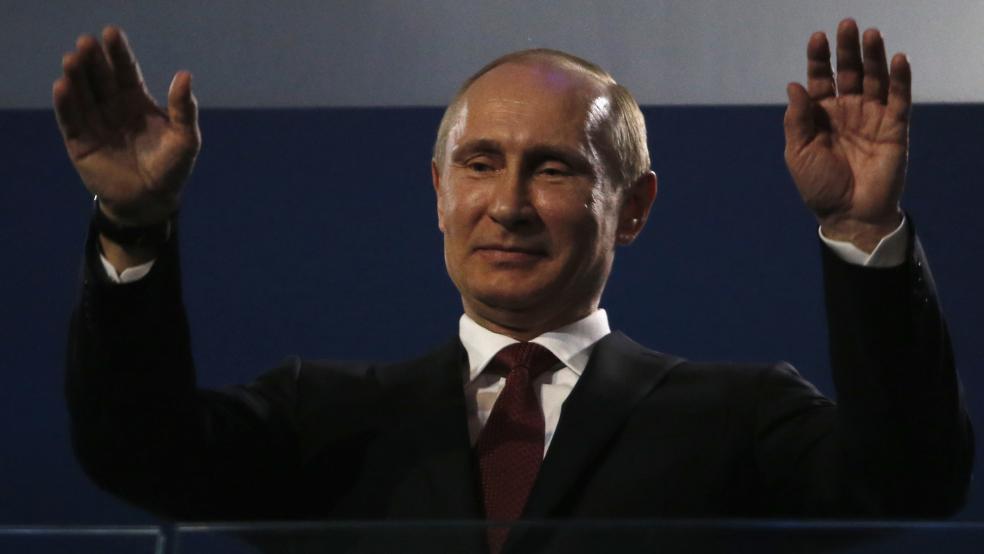The post-Cold War world was well defined. Chastened after the fall of Communism, Russia gave up its satellite states and retreated to Moscow. NATO, created to defend Europe from a Russian invasion, became less relevant. The Organization for Security and Cooperation in Europe (OSCE) extended membership to former members of the Soviet Union, pledging to protect their borders.
Now, with the Russian invasion of Crimea, a Ukrainian peninsula with deep ties to Moscow, Russian President Vladimir Putin has completely destroyed nearly all of it.
Related: Russian Ties to Ukraine Go Much Deeper than Gas
“The post-Cold War order is over,” said Temuri Yakobashvili, Georgia’s former ambassador to the United States, who is now a senior transatlantic fellow at the German Marshall Fund. “A number of international organizations have become obsolete.”
The ineffectiveness of these institutions has been on full display in recent weeks. Beyond condemning the action, NATO has not been able to develop a coordinated response. Observers from OSCE have been turned away from Crimea. Russia, meanwhile, has sent a clear and aggressive signal to former Soviet bloc states.
“All realistic options look bad,” said Joerg Wolf, editor of the Berlin-based open think tank atlantic-community.org.
Two weeks after Russia’s invasion, and a day after Crimean voters overwhelmingly voted to join Russia, the west finally punished Russia. The United States imposed sanctions on 11 Russian and Ukrainian officials connected to the invasion, freezing their assets. The European sanctions targeted 21 individuals connected to the invasion. These represent the harshest punishment levied by Europe and the United States since the end of the Cold War.
Related: Putin’s End Game: Play the Trump Card
“Going forward, we can calibrate our response based on whether Russia chooses to escalate or to de-escalate the situation,” President Obama said when announcing the sanctions. “And as we go forward, we’ll continue to look at the range of ways we can help our Ukrainian friends achieve their universal rights and the security, prosperity and dignity that they deserve.”
Critics to Obama: Not Enough
The Russian economy has taken a hit since the Crimea invasion, with the Russian stock market and rubles suffering steep losses. For the first time Monday, the Russian government admitted the pain when Deputy Economy Minister Sergei Belyakov said, "The economic situation shows clear signs of a crisis.”
Critics of the president, including Sen. John McCain (R-AZ), say that Obama’s actions are not strong enough. “I don’t know how it could have been weaker besides doing nothing,” McCain said Monday on MSNBC.
That’s because Putin, by any standard of international relations, is not acting rationally. Numerous reports indicate that he believes that Ukraine is not a legitimate country, and that it belongs to Russia.
“It simply is not plausible that this approach will have any impact on Putin’s behavior. He clearly is willing to incur some financial downside for the glory of seizing Crimea. This is just about the least amount of pain that could conceivably be applied short of doing nothing,” said former Bush administration State Department senior advisor Christian Whiton.
Related: Does Putin Want to Carve Up Ukraine and Take the Spoils?
“Our interest now is convincing Putin that there would be a real cost to encroaching on other parts of the former USSR,” he added. “So far, Obama has been hazy on this. We should not commit U.S. forces to Ukraine, but along with Europe, show clear resolve to support Ukraine’s military if it comes to that.”
Putin Undone?
As the crisis drags on, it’s becoming increasingly clear that Putin’s position is not as strong as many initially believed. Economic losses aside, Putin has alienated Germany, his most important ally, with Chancellor Angela Merkel saying that Putin lives in “another world.”
It has also roused a sleeping beast by causing Europeans and Americans to question whether they need to build military resources to check Russian aggression.
Related: Putin’s Oligarchs Are Key to War and Peace in Ukraine
“We may see one more item in transatlantic agenda. One is technical, the free trade agreement,” said Yakobashvili. “Now, the future of NATO is on the agenda. Most likely they’ll have to go back to their old Cold War posture…We are entering into a new phase of the Cold War.”
Yakobashvili added that the invasion would force the West to view potential invasions of other countries attempting to deepen ties with Europe as a possibility. “It’s high time for [former Soviet bloc states] to get more than promises.”
Whiton also said that the crisis could force Europe to take its energy security more seriously. Russia supplies the bulk of Western European energy, and despite playing lip service to diversifying supply lines, Europe has done little to wean themselves off Russian gas.
“Long term, we should seek to replace Russian energy in Central Europe with American energy, especially natural gas. That will take power and money from Putin without firing a bullet,” Whiton said.
Top Reads from The Fiscal Times:
- Pressure on Putin As Russian Wealth Disappears
- Four Other Planes That Vanished Mysteriously
- Obama Used Invisible Ink to Draw a Line with Putin




